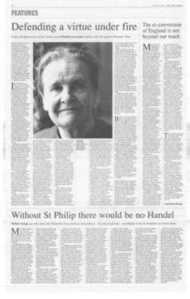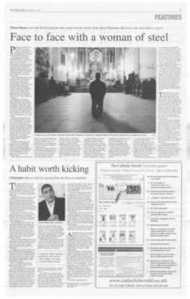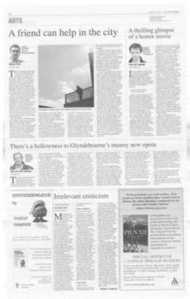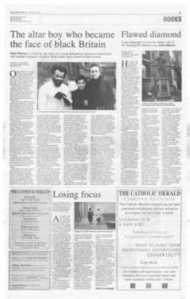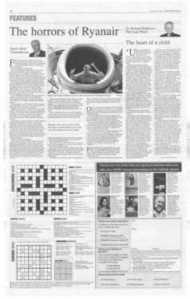Page 3, 22nd August 2008
Page 3

Report an error
Noticed an error on this page?If you've noticed an error in this article please click here to report it.
Tags
Share
Related articles
David Cameron Supports Abortion On Demand
Cardinal To Press Hewitt Over Abortion Limit
Tory Mp Aims To Lower Abortion Limit To 16 Weeks
Cameron Takes Brown To Task Over Conscience Vote
Cardinal Persuades Blair To Support Review Of Abortion Law
Cameron opposes limits on disabled abortions
Tory leader reflects on life with disabled son and concludes that parents must have right to abort
BY SIMON CALDWELL
DAVID CAMERON has made a highly personal defence of the controversial practice of aborting disabled babies up to birth.
The Tory leader insisted it would be wrong to prevent a mother terminating a pregnancy because her baby was handicapped.
He said he would "not want to change" existing laws that permit abortions after the 24week limit if tests show the baby is disabled.
The Tory Party leader said his views have been shaped by becoming a father to a disabled child himself — six-year-old Ivan, who was born with cerebral palsy and suffers from severe epilepsy, needing 24hour care.
Mr Cameron talked about his own circumstances to explain to voters why he would not be supporting an amendment in the autumn to specify a range of conditions under which disabled children can be aborted.
He told a question-andanswer session in Barrow-inFurness. Cumbria, that he would like to see the upper time limit for abortions cut from 24 to 20 weeks and that it was right that there were free votes on such matters.
But he argued that. in his view, it would be wrong to stop mothers from aborting a disabled child at any stage.
"In the case of parents who have medical evidence that they may have a very disabled child, I would not want to change that," Mr Cameron said. "And I speak as someone, I mean, I've got a sixyear-old boy who is severely disabled, has cerebral palsy and is quadriplegic and he's a sweet boy. he's a lovely boy Ivan, and, you know, it is though incredibly tough bringing up disabled children and I don't want to kind of put myself in the position of saying to other parents you've got to go ahead and have that child or you can't have an abortion or you can do this or you can't do that.
"Personally, Ivan, he's brought incredible things to my life but it is an enormous challenge and I don't think it's right to sort of tell other parents if you hear that you've got a very disabled child on the way that actually doing something about it isn't an option. That's my view."
Mr Cameron was speaking at a "Cameron Direct" meeting last week as part of a tour of the country to raise support for the Conservatives. His comments came in response to a question from Rachel Peck, a member of the audience.
She said: "In 1990 when Mrs Thatcher was Prime Minister the Human Fertilisation and Embryology Act discriminated against the disabled by allowing disabled babies for the very first time to be aborted right up to full term. My question is: If in power would you favour measures to reverse this discrimination by giving unborn children who are disabled the same protection under the law as currently enjoyed by all other children?"
In speaking openly about his family Mr Cameron, who aLso has a four-year-old daughter, Nancy, and a two-year-old son called Arthur, is ignoring the advice of Conservative Patty strategists.
Jim Dobbin, the chairman of the All Party Parliamentary Pro-Life Group, described Mr Cameron's remarks as "shocking". "As far as I'm concerned this is an equality issue," said Mr Dobbin. "His statement allows abortion up to birth for the disabled and this sends out a horrifying message to people with disabilities. Is a child a less valuable member of society one minute before it is born than it is one minute after it is born? This is telling people with disabilities that they have fewer human rights than people without disabilities. He is saying a person is only of value if they have no defects. This sounds like eugenics to me."
The Labour backbencher added: "Many people with severe disabilities have contributed greatly to humanity and if legislation that is in place today had been available when they were in the womb they might have been aborted and the world would have been a much poorer place. Nobody has the right to decide that some lives are not worth living. Every life is precious. The question is: who is going to speak up for the disabled?"
John Sraeaton, director of the Society for the Protection of Unborn Children. said he found Mr Cameron's comments "incredible" given his personal circumstances. "In the current political climate there is no hope of changing the law," be said. "But what is significant is that you have major political figure who could be in a tmique position to raise the issue of discrimination against the disabled and he has completely outmanoeuvred himself by this extraordinary position he has adopted."
Last year there were more than 200,000 abortions in England and Wales, up from 175,000 in 2002. 'More than 95 per cent are carried out for socalled "social" reasons.
Some 2,000 abortions a year are on grounds of disability, representing about one per cent of the overall total number of abortions. Of these, more than 100 are performed after 24 weeks. In one region. the south west, 117 babies with club feet, cleft palates, or webbed or extra fingers and toes were aborted between 2002 and 2005. Across the county more than 400 pregnancies a year are terminated because of Down's syndrome.
Abortion up to birth on the grounds of severe disability was not included in the original Act but was successfully introduced as an amendment by the Tory MP Kenneth Clarke when the law was last changed 18 years ago. The law has broad support in Parliament and the Prime Minister Gordon Brown has voted for it three times.
But it is controversial because there is no legal definition of what constitutes "serious" disability and some babies have been killed for treatable, minor conditions including cleft palate, club feet, webbed fingers or missing digits.
An amendment has been tabled to the Human Fertilisation and Embryology Bill, which returns to the Commons for its Report Stage in the autumn, to list the minor conditions for which abortions will not be permitted after 24 weeks. Amendments will also be tabled to radically liberalise the 1967 Abortion Act. They include allowing abortions to be carried out by nurses and midwives as well as by doctors, abortions in private homes as well as clinics and the extension of the Act to Northern Ireland. An amendment has also been tabled to scrap the requirement of the consent of two doctors before an abortion can go ahead; a move which would effectively allow abortion on demand in the early stages of pregnancy.
Mr Cameron has already signalled his support for such a move, describing it as "practical and sensible" on the grounds that it might reduce the number of later abortions.
But the British Pregnancy Advisory Service has indicated that scrapping the two-signature requirement would not reduce late-term abortions.
Editorial Comment: Page 11
blog comments powered by Disqus









